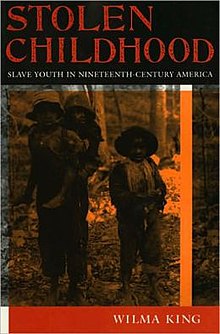Stolen Childhood

First edition cover, 1995
|
|
| Author | Wilma King |
|---|---|
| Country | United States |
| Language | English |
| Subject | Slavery, child slaves, African American families |
| Published | 1995 (Indiana University Press) |
| Pages | 284 (1st ed.), 544 (2nd ed.) |
| ISBN | (1st ed.), ISBN (2nd ed.) |
| 306.3 | |
| LC Class | E441.K59 |
Stolen Childhood: Slave Youth in Nineteenth-Century America is a 1995 history book about nineteenth century slave children in America by Wilma King. As the first full-length book on the subject, it began the scholarship of slave childhood. The book uses historical documents to argue that enslaved children were deprived of experiences now understood to constitute childhood, due to early work responsibilities, frequent bodily and emotional trauma, and separations from family. The book covers themes of the children's education, leisure, religion, transitions to freedmen, and work expectations. It was published in the Indiana University Press's Blacks in the Diaspora series, and a revised edition was released in 2011.
Critics regarded Stolen Childhood positively for taking the historiography of children, slavery, and education in an unexplored direction. Scholars placed the book in a lineage of studies on slave families and women, with King's book as the first dedicated to slave children. Reviewers generally praised her research contribution, but condemned the book's structure and repetitive style. The book won the 1997 Outstanding Book Award from the National College of Black Political Scientists. Choice named King's 2011 revised edition an "outstanding title" for academic libraries.
Stolen Childhood: Slave Youth in Nineteenth-Century America broadly documents nineteenth century slave children and their lives. It was the first full-length book on the subject, and at the time of its publishing, the topic of enslaved children was underrepresented in American slavery scholarship. The book is part of Indiana University Press's Blacks in the Diaspora series, and was first published in 1995, with a revised edition in 2011. King taught history at Michigan State University when the first edition was released.
King argues that enslaved children did not have the opportunities for childhood and thus, did not have childhoods. Slave children instead worked as soon as they could, were often separated from caregivers and family, and were subject to punishment of many sorts, sometimes no different than those levied on adults. The children's trauma was compared to that of war—enduring abuses, sexual exploitation, inability to protect themselves—and they aged prematurely through these experiences.
...
Wikipedia
